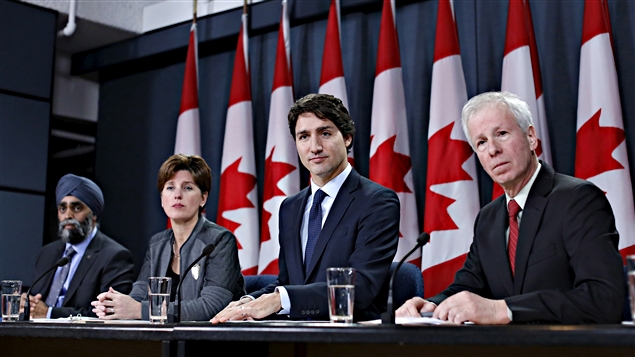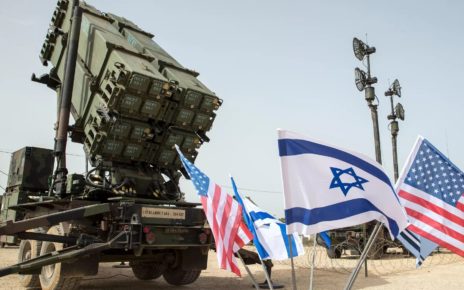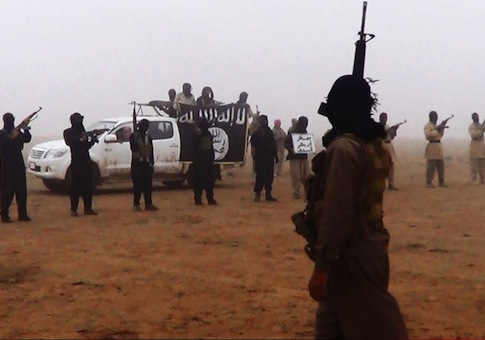This week, the Trudeau government announced the revamping of Canada’s role in the anti-ISIS mission. Canadian CF-18s are being withdrawn from the bombing campaign, while the number of Special Forces training Iraqi forces will be tripled and there will be a new humanitarian focus on the region’s refugee crisis.
Was this a wise course correction? Will it prove more effective in countering the threat posed by ISIS?
Aleksi Korpela: A Modest Proposal
Program Editor, Procurement
Yes, Canada’s reconfigured role will be effective in supplementing the efforts of the Combined Joint Task Force against ISIS.
The withdrawal of CF-18s from the fight seems counterintuitive, but nonetheless makes sense because major advances by ISIS have been stopped. Available targets are becoming increasingly “soft,” since ISIS has already lost much of its heavy matériel. Also, maintaining and operating jet fighters is expensive, costing around $16,000 per hour. Dropping bombs (i.e. JDAMs) is not cheap, either; these cost about $25,000 a piece. According to a parliamentary budgetary assessment, aircraft operations alone (excluding supply flights) account for over half of the expenditures in Canadian operations against ISIS.
The revamped focus on providing intelligence, aerial refuel capabilities, and training local militias makes sense. Not only are these activities cost-effective—more bang for the buck, more rumble for your ruble—but they also provide mission-critical capabilities, such as intelligence air refuel. Training and advising may seem less important than airstrikes, but disciplined militias are the key to avoiding the deployment of Canadian ground troops to active combat roles if the situation goes sour.
Additionally, the enhanced humanitarian aid effort is an important development in realizing that, whatever is the solution to the crisis, it is not purely a military one. A multi-modal effort is required because the problem is not only armed conflict, but also poor infrastructure, internal displacement, humanitarian crisis, and an absence of governance.
Therefore, the new approach is more nuanced, more cost-effective, and better adapted to the circumstances than the previous arrangement. After all, you can’t bomb your way to victory; that has been demonstrated in Vietnam, Afghanistan, and Iraq.
Michael Lumbers: The West Can’t Provide a Long-Term Solution
Program Editor, Emerging Security
As befits a medium power with a limited capacity for power projection, Canada’s military contribution to the anti-ISIS campaign under any government will never be more than token in nature. Washington appreciates the symbolic value of input from Canada and other such countries, yet White House officials were not waiting with bated breath as the new Trudeau government deliberated over revisions to the ISIS policy it inherited from its predecessor, for such an effort will not prove decisive in determining the fate of this mission.
While Canadian policy is undoubtedly based in part on calculations of the perceived threat posed by ISIS, it should also be noted that Trudeau’s announcement of a revamped role in this campaign was driven primarily by considerations owing little to a nuanced reading of the region’s history and the challenges presently buffeting it. As with Ottawa’s participation in past conflicts like Korea, the Persian Gulf War and Afghanistan, Trudeau’s decision to stay involved in the campaign against ISIS is motivated above all else by a desire to have a voice at the table and to preserve goodwill with Canada’s most significant ally by showing solidarity. Additionally, he wished to keep faith with his party’s base by adhering to an election promise to withdraw CF-18s from bombing runs, even though it’s one evidently not supported by a majority of Canadians.
To the extent that a military solution to this threat exists, Western bombing can effect damage, but is hardly sufficient to root out ISIS forces embedded with the local population. That can only be accomplished through ground assaults conducted by local actors; not even the most hawkish of those currently vying for the Republican presidential nomination advocate taking the military lead on the ground. Seen in this light, Trudeau’s decision to double down (or triple down, in numerical terms) on Canada’s advisory/training role in northern Iraq is potentially more fruitful than contributing minimally to a bombing campaign that can produce, at best, only partial results.
Ultimately, however, the sectarian fault lines that have set Iraq, Syria and the wider Middle East aflame cannot be bridged by the mere application of military force. Even if ISIS is pounded into submission or forced to withdraw from territory it now occupies, the widespread sense of Sunni marginalization on which ISIS has capitalized will not evaporate on the battlefield. Barring dramatic reforms in regional governance, a successor to ISIS would eventually emerge, much as ISIS arose from the ashes of al-Qaeda in Iraq.
Michael Kang: Bombs Away
Research Analyst
Upon the conclusion of Canada’s participation in air strikes against ISIS, Canada and its allies will lose a strategic and perhaps more effective tool in their arsenal. Despite Canadian air strikes comprising only 2.6% of the coalition’s total, they provided a useful means of targeting ISIS positions, strongholds, staging grounds and compounds. By contributing CF-18s, the Canadian military was able to minimize the number of troops exposed to combat situations, while also allowing for a proactive and pre-emptive response to developments on the ground.
Yes, it is necessary to have ground troops to execute missions and retake lost territory, and with Canada taking a larger role in sending more troops to train, advise and assist Iraqi troops, local partners will be better prepared. However, placing a larger onus on Iraqi forces comes with risks, given their recent propensity for abandoning posts. Moreover, precision-guided missiles have the capability to destroy ISIS military hardware and weaken ISIS ground capabilities, which is an efficient alternative to direct ground combat.
By withdrawing from the bombing campaign against ISIS, Canada has surrendered some of its diplomatic leverage and influence in the region even as more special forces are exposed to combat situations.
Drazo Kraishnik: Follow the Money – Then Burn It
Program Editor, Expanding Community
Canada’s revamped role will not prove effective in countering ISIS, simply because Canada and Western nations are not tackling the issue at its root: covert Saudi and Turkish support for ISIS. It’s no longer a secret that the House of Saud has been financing and supporting Sunni militants, extremists and terrorists throughout the world, and yet no Western leader publicly shames or draws attention to this collusion. The Turkish government under Erdogan is no better. Russia has provided satellite evidence of the daily oil smuggling ISIS conducts into Turkey, but Ankara has not been called on to account for its actions.
Canada’s response to problems in Iraq and Syria won’t tip the balance. This is yet another quagmire the U.S. has created in a volatile region that will only end in state collapse, mass killings and frozen conflict. An idealist would say that the West needs to encourage regional leaders to work together to fight off ISIS and bring about a democratic government in Syria. Unfortunately, in a region where most of America’s local allies are in collusion with the same forces the West is trying to destroy, this scenario will prove elusive.
The Middle East’s borders are being redrawn with or without the West. The West should abandon hopes of exporting democracy to the region; the most important objective is peace. Syria, Libya, Iraq and Ukraine were peaceful before the U.S. attempted to spread democracy; look at each now. Penalizing those “allies” in the region that are supporting ISIS would be a start. If ISIS’ income is restricted, its capabilities will be limited.
David Sutton: Replacing Jets With Trainers Is a Sign of Progress, Not Evasion
Program Editor, Society, Culture, and International Relations
Jets or trainers? In weighing the two, it seems that the benefit of aerial bombardment has run its course as an effective means of rolling back ISIS. As Joseph Trevithick observes, the initial need to destroy equipment that ISIS captured from Iraqi forces has been met, and remaining targets consist mainly of minor assets. Couple that fact with the costs of operating and supporting jets, and the strategy of aerial bombardment seems dubious. Finally, although ISIS controls territory, its continued existence is tethered to its ideology and personnel, not to equipment or locations.
The training of local militias and Iraqi troops, while not a solution to the eradication of ISIS’ ideology, at least increases the chance that territory can be retaken. Iraqi forces need to hold out long enough for a solution in Syria and for real reforms of the Iraqi government to take form. While Iraqi forces have suffered embarrassing setbacks in the past, efforts to bolster their effectiveness have already borne fruit as they gain ground against ISIS, as Vice Admiral David Johnston, Chief of Joint Operations for the Royal Australian Navy, has noted.
Critics have been quick to pronounce the shift from jets to trainers as a shameful abandonment of Canada’s commitments. One wonders if they heard U.S. Defence Secretary Ash Carter reiterate during a February 11 news conference that training Iraqi troops and aerial surveillance are also key elements of NATO’s strategy. Moving from bombardment of targets to supporting local and coalition forces with intelligence and training is not just a smart move on the government’s part, but a positive sign that the conflict against ISIS has progressed to a new stage.
Vedran Kuljanin: More Than Nothing, But Less Than Something
Research Analyst
Regardless of the path Canada chooses to take, the only certainty is that there is no perfect, low-cost strategy that would prove to be an effective solution. Canada’s decision to increase the number of Special Forces in northern Iraq will prove to be a step in the right direction in the fight against ISIS, albeit a long, expensive, and slow step.
The West needs to counter ISIS without a massive military intervention. Yet the complexity of steering a prudent course between underreaction and overreaction is deepened by a number of factors that will be difficult to overcome.
Some of our allies, such as Turkey and Saudi Arabia, are more inclined to topple Assad and contain Iran than to assist in the stabilization of Syria. Their actions stem from self-interest, which means our military moves will never feel secure. Providing intelligence to the units fighting on our side has already proved to be successful and needs to not only be maintained, but maximized.
On the other side, Iran and Russia will have a say in the outcome of this troubled region, whether we like it or not. Creating a military strategy that counters Iran and Russia could bring much more destruction to the Middle East than it prevents. By increasing our intelligence forces and reducing military action, we can avoid the stagnation caused by self-interested moves, in contrast to Turkey and Saudi Arabia.
The current stalemate in Syria renders any military strategy on the ground ineffective. Neither side is capable of toppling the other with military force alone; providing the right intelligence to the right allies on the ground is the only option that will prove successful for Canada.




